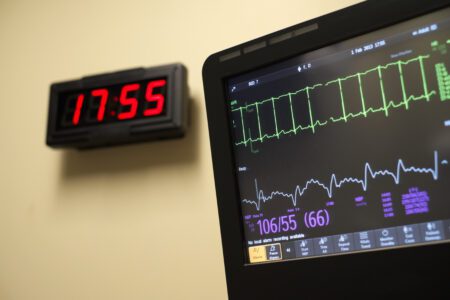Introduction
Time is the backbone of our daily lives, governing everything from personal schedules to professional deadlines. Keeping time synchronized in large buildings and facilities is essential to ensure smooth operations and efficient communication. In this blog post, we will explore the significance of clock synchronization in various industries and delve into the different applications and benefits of synchronized clock systems.
The Role of Clock Synchronization in Buildings and Facilities

Clock synchronization is the process of ensuring that all clocks within a network display the same, accurate time. This ensures that every individual in a building or facility is working from the same time standard, which has numerous advantages:
- Improved efficiency: A synchronized clock system helps streamline work processes, reduce confusion, and minimize delays caused by discrepancies in timekeeping.
- Enhanced safety: In emergencies, precise timekeeping is crucial for coordinating evacuations and response efforts.
- Accurate record-keeping: Synchronized clocks help maintain accurate records for billing, attendance, and other time-sensitive data.
- Regulatory compliance: Many industries have specific timekeeping requirements to comply with legal and industry regulations.
Industries Where Clock Synchronization is Most Utilized
Clock synchronization plays a vital role in various industries, each with its specific applications and requirements:
- Healthcare

- Precise timekeeping is crucial for coordinating patient care, managing medication schedules, and maintaining
accurate medical records. - Clock synchronization helps streamline hospital operations, from surgery scheduling to staff shift changes.
- Precise timekeeping is crucial for coordinating patient care, managing medication schedules, and maintaining
- Manufacturing
- Synchronized clock systems ensure production lines run smoothly, reducing downtime and improving overall efficiency.
- Accurate timekeeping is essential for coordinating logistics, maintaining inventory, and complying with regulatory requirements.

- Education
- Synchronized clocks create a cohesive learning environment by ensuring classes and exams start and end on time.
- Accurate timekeeping helps maintain a structured schedule, improving the overall learning experience for students and staff.
- Transportation
- Precise timekeeping is critical for coordinating schedules and ensuring the smooth functioning of airports, train stations, and other transit hubs.
- Synchronized clocks help prevent delays, maintain safety standards, and
 provide passengers with accurate arrival and departure times.
provide passengers with accurate arrival and departure times.
- Government and Public Services
- Synchronized clocks ensure that government agencies, public utilities, and emergency services can respond quickly and efficiently to incidents.
- Accurate timekeeping helps maintain public trust and confidence in these essential services.
Synchronized Clock System Technologies
Modern synchronized clock systems utilize various technologies to ensure accurate timekeeping and easy integration with existing infrastructure:
- GPS (Global Positioning System): GPS-based synchronized clock systems use satellite signals to provide accurate, universal timekeeping.
- NTP (Network Time Protocol): NTP is a widely-used method for synchronizing time over a computer network, enabling easy integration with existing IT infrastructure.
- Wi-Fi: Wi-Fi-based synchronized clocks connect to a local network and synchronize time using NTP, providing a flexible and cost-effective solution.
In summary, synchronized clock systems play a critical role in ensuring the smooth functioning of various industries, from healthcare and education to transportation and government services. By providing precise, consistent timekeeping, these systems not only improve efficiency and safety but also help maintain accurate records and ensure regulatory compliance. As technology advances, we can expect synchronized clock systems to become even more integral to our daily lives and operations.
Total Fire Protection, a leader in the industry, proudly offers a wide range of quality clock and synchronization products, including the highly-reliable Primex Synchronized Clock Systems. These cost-effective solutions are designed to address the unique needs of each industry, ensuring accuracy, reliability, and seamless integration with existing infrastructure.
Learn more about Total Fire Protection’s synchronized clock systems and discover how we can help enhance the efficiency and safety of your organization.



 provide passengers with accurate arrival and departure times.
provide passengers with accurate arrival and departure times.


